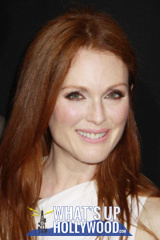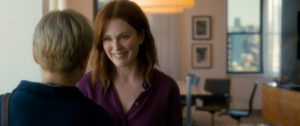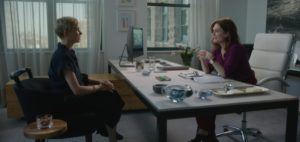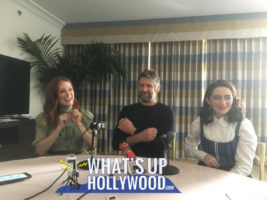By: Izumi Hasegawa August 30, 2019

She is an Oscar winning actress and received awards from three of the largest film festivals (Venice, Canne and Berlin). A wife, a mom, an activist, a children’s book author, and with over 72 films under her belt she is still one of the most sought after actresses today. Meet Julianne Moore, the woman behind this list of accomplishments who somehow can allow you to feel like you’re sitting down with your next door neighbor to interview them.
We sit down with Moore to chat about her newest project, After the Wedding co-starring Michelle Williams and Billy Crudup and directed by her husband Bart Freundlich. Moore stars as Theresa, a wealthy CEO of a media company and benefactor who wants to donate funds to an orphanage in India, run by Isabelle (played by Michelle Williams). Isabelle travels to New York to meet Theresa to discuss the donation and is invited to attend a wedding which ignites a series of events in that the past collides with the present as mysteries unravel.
 Q: Why did you choose to play Theresa instead of Isabel, when you could have probably done either role?
Q: Why did you choose to play Theresa instead of Isabel, when you could have probably done either role?
You’re the first person who’s asked me that question, thank you for that. That’s so interesting, because no one else has said that. So Bart (director, writer Bart Freundlich. Julianne’s husband) had been approached to do an American adaptation of Susanne Bier’s beautiful Danish film. We were just in our house, in our family room, watching the movie because I’d never seen it before. We were just watching it and I was really enjoying it. And right away I was so struck by what Rolf Lassgård was doing. I was like, “I love that guy.” He had such a big presence, and he was also so opaque. Like I didn’t know what was happening with him. And then with the final reveal, I was like “Whoa.” It really really struck me. And I just turned to Bart at the end. and I said, “Now that’s a part I’d like to play.” I just love the part. I love what he did, I love the part. And so without any idea, and then later on when they were talking about me and mentioned the gender flip, I got very excited. And I was like, “Well, I’m in.” It just was different. I was also really compelled by the idea of somebody, especially with the gender flip, that she had built this huge life for herself, this big, big career, this company that she cared about. It was very personal. She cared about her employees, she cared about who she was going to sell it to . And at the same time she had this really wonderful family that she was very invested in. And sometimes when you see those boss ladies from whatever movie, they’re very [inaudible] paper thin. And they’re usually evil and they exist to be a foil to somebody else. But I know a lot of women who’ve built big lives, who have big careers and big families and care about it all equally. And I wanted to see that represented and I wanted to play that. So I was very excited and also, sadly, I think we both knew a couple of people who had done exactly what Theresa had done, which is to, don’t help me give it away, which is to hide their illness from everyone.
 Q: What was it like playing a mother to a young adult?
Q: What was it like playing a mother to a young adult?
I am a mom. We have a 21 year old son. First of all, we saw Abby’s audition, [inaudible] Abby. We were both so blown away by the depth of her talent and how perfect she was for the part. And I think we really needed to have someone who was exactly like Abby, (inaudible) Abby’s place, which is a young adult who is still not a full adult. This idea that you’re 28 or whatever, and it’s like this character is in this very delicate place. She’s so sensitive too, you think like, “Well she’s saying she’s legal.” She can get married, but maybe she’s too young to get married. But legally she’s able to, so Abby was able to embody that really perfectly and that’s really a tough line to walk. That stage of early adulthood.
 Q: Your character in the movie has a large age gap between her and her younger husband. Your personal marriage has a similar age gap. What is the beauty and challenges of this in your personal life?
Q: Your character in the movie has a large age gap between her and her younger husband. Your personal marriage has a similar age gap. What is the beauty and challenges of this in your personal life?
I don’t honestly think it makes a lot of difference. I talk about it with my kids too. When you are 11 versus somebody being 20, it makes a big difference. Those are really different life stages. But I think that now at 49 and 58, it’s not shallow. And that being said, if it were reverse, no one would comment on it. So if that’s been happening for years…there are relationships where men are significantly older, like 25 to 30 years. And people kinda comment on it but they’re like whatever. But I think it’s becoming more. What I’ve even noticed with our daughter, when I was growing up you never would go out with a guy who was a couple years younger than you are. And now they don’t care. So I do think that there has been a culture shift. It becomes more human. I think that’s something. When you’re 11 and 20, it’s a problem. But later on…[laughs].

Q: How did this experience compare with “The Myth of Fingerprints” for both of you?
Probably not at all. I think we communicate very clearly. I’m always very clear about what I want to accomplish in a scene and I felt comfortable communicating that with him. And one of the things that he did that so impressed me in “The Myth of Fingerprints,” as a first time film director, was how easily he adapted himself to all the different styles of the actors he was working with. There were lots of different in there with a myriad of styles, and he was able to give each and every actor exactly what they needed. And there’s always his real generosity as a filmmaker and gives everybody the space they need to do the work that they’re doing. And that’s remained consistent throughout his career.
 Q: This movie feels so real. The credits mentioned this was based on a Danish film, but I wasn’t sure if that was based on a real life. When you mention the gender flip, do you think that was added to make it feel more real?
Q: This movie feels so real. The credits mentioned this was based on a Danish film, but I wasn’t sure if that was based on a real life. When you mention the gender flip, do you think that was added to make it feel more real?
In the Danish film, people don’t have all the information. There wasn’t knowledge of a child, and once again this is tricky stuff to write about. But because every decision has been so considered, it was so deliberate. There actually was a child. People have to decide what to do. They all made a decision based on their knowledge at the time, the best decision they thought they could make. And they’re all realizing later that all these decisions have had real consequences, tremendous consequences, that haven’t necessary been good ones. But they’re very human. I love the judgment for I feel like with Isabel and Theresa morally they think they’re coming from the right place. And they have tremendous judgment about the choices that the other one made. And I wanted to make that clear in that scene.
Q: How do you juggle your life and also what’s the relationship between you, your children, and using cell phones?
Well I’ll address the big life thing too. Like I said, I think initially one of the things that really attracted me to it is I don’t have a company. It’s not like I have Verizon Media or whatever. But I’ve managed to do what I’d hoped to do which is to have a career that I love, that I care about, that I’m very invested in. And a family that I love and that I care about, and that is the whole center of my life. I wanted to represent that. I really hated that whole period where they kept saying about women, “You can’t have it all.” I’m like, “What? Yes you can! yes you can!” It’s not easy. I don’t think there’s a person in the world who has a job and a family thinks that it’s like, “Well, this is easy.” There are always things that go on either side. But it’s valuable, it’s worth it. It’s the most valuable thing in the world to have that. It’s wonderful for you as a human being. It’s wonderful for your family. Everybody, everybody needs to have love and work. That’s what Freud said. It doesn’t have to be paid work. But to have something you care about that’s personal to you and then to have someone to love. If it’s a human being and family, animals, whatever. But you have to have those things. So anyway, by way of saying it’s nice to see that. It’s a good thing. and I don’t like it when people are like, “Oh well, you can’t have this,” or “You sacrifice that.” I wanted to represent that that way. In terms of cell phones, I think that’s a whole other story.
Q: A lot of great films have a lot of great ensemble work in the framework. You worked with Robert Altman, who uses overlapping dialogue and ensembles in script collaboration. Can you take some of those lessons and still apply them today?
Altman was a filmmaker that I saw, it was the first time I saw a movie where I noticed a directorial presence. I saw 3 Women in Revival house when I was in Boston. And somehow I missed all the films he made in the 70’s because I was too busy watching TV because I was a kid. And I saw this movie and I was like, “What is that? Who is that?” Suddenly I saw that there was somebody directing a movie, telling me a story. And for the first time in my life I said, “I want to do that. I think I want to work with somebody like that.” It just woke me up to cinema and to Bob in particular. I think Altman shaped my consciousness about what was possible in film about the kind of things that made me relate most intensely. So I hope I carry that with me everywhere. Because I think that idea of what it’s like human being interesting and relatable and meaningful. What do I remember? There are so many movies you can go to and you’re like, “Well, let’s get dinner.”
 Q: So what’s next for you?
Q: So what’s next for you?
I’m doing a series for Apple called Lisey’s Story based on Stephen King’s book of the same name that Pablo Larrain is directing. So we start shooting that in New York in a couple of months, and it’s super exciting. It’s the story of a marriage, and there’s a very strong kind of horror slash fantasy element to it as well.
Q: What’s your dream role?
My dream role. I don’t know. I don’t ever know. I always say that character doesn’t come first for me, story comes first. Narrative comes first. So somebody would say, “Oh, you can play the Jolly Green Giant, and you get to wear these clothes, and you get to shoot in [inaudible].” And then I’m like, “What’s the story? What is the Jolly Green Giant doing?” Then I’ll know whether or not I want to do it. So I have to wait for the story to present itself.
Q: Do you do any charity work?
I’m the founder of this organization called The Creative Coalition for Everytown for Gun Safety. I’ve been doing it for about four years. Everytown has aligned with Moms Demand Action. We work on changing culture and legislation around gun violence.
Q: What motivates you to keep working at such a high level given all of your accomplishments over the years, and the fact that you’ve starred in big blockbusters, and won all the acting awards you could pretty much win?
That’s an interesting question. It’s funny because I’ve talked to a couple of my peers about that too, other women who’s work I admire, We talk about like at what point you’re like, “What? Why am I doing this? What am I doing?” [laughs]. You know, but it’s interest. I’ve always been compelled by these stories and by human behavior. And so I think if it stops being interesting to me, I’ll stop doing it. But I really like it. I feel like I’ve changed so much from when I started wanting to be an actor, nobody even understanding why I was drawn to it. Now my interest just gets deeper. So it’s just an exploration of something. And like I said, back to the Freud thing about work. What’s your work? What’s that thing that makes you kind of lay up? When you find that, you wanna kind of keep digging and keep doing it because it makes you feel alive.
After the Wedding is currently playing theaters nationwide.
For more info on the film, theatre locations, and ticket info please visit the film’s official website at https://www.sonyclassics.com/afterthewedding/#1stPage
Facebook: https://www.facebook.com/AfterTheWeddingFilm/
For more info on Juliann’s community group, visit their official page at https://everytown.org/creative-council/?source=prno_creativecouncilp
Interview by: Izumi Hasegawa – https://twitter.com/HNW_Izumi & Instagram: https://www.instagram.com/izumihasegawa/
Edited by: Jody Taylor – https://twitter.com/RealJodyTaylor & https://www.instagram.com/realjodytaylor
Follow Us: What’s Up Hollywood at https://twitter.com/WhatsUpHWood and Facebook: https://www.facebook.com/whatsuphollywood/
